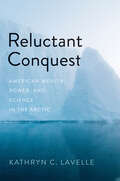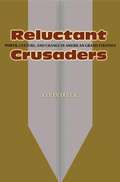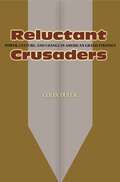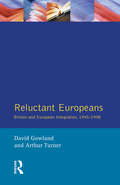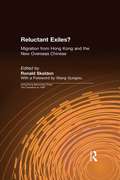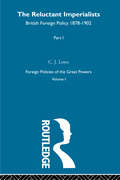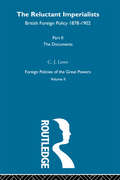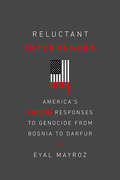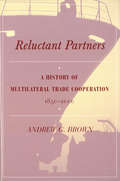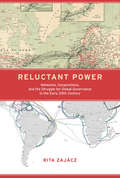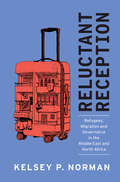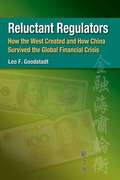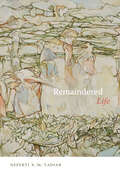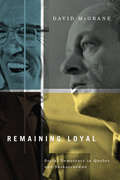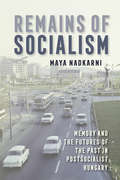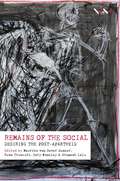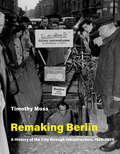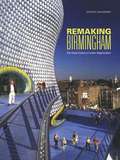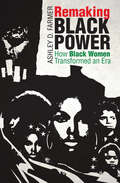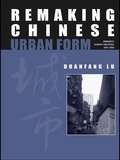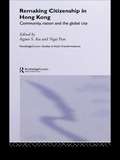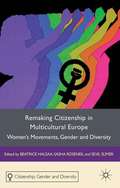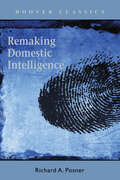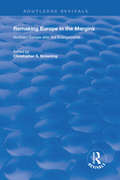- Table View
- List View
Reluctant Conquest: American Wealth, Power, and Science in the Arctic
by Kathryn C. LavelleA comprehensive history of U.S. involvement in the Arctic, from the American Revolution through the acquisition of Alaska to the present day What drives American foreign relations in the Arctic? It is difficult to give a unified answer to this question because most histories of the region are divided between the Atlantic and Pacific coasts, Asian and European strategic interests, or federal government and Indigenous peoples&’ concerns, making it difficult to understand the connections among the environmental challenges, scientific understandings, strategic calculations, and governance relationships. Most Americans do not think of their country as an Arctic power, yet it is a region where the United States has had important ties throughout its history. In this sweeping study, from the founding of the country through the acquisition of Alaska to the present, Kathryn C. Lavelle considers American relations across the circumpolar North, incorporating discussions of economics, national security, and science that are conventionally separated. Lavelle argues that it is impossible to understand U.S. policy without a knowledge of American political development and of how scientific understandings have grown alongside studies of climate and other environmental issues. This history has important implications for future American policy regarding traditional national security and political economy, in addition to climate change and environmental cooperation.
Reluctant Crusaders: Power, Culture, and Change in American Grand Strategy
by Colin DueckColin Dueck examines patterns of change and continuity in American foreign policy strategy by looking at four major turning points: the periods following World War I, World War II, the Cold War, and the 9/11 terrorist attacks. He shows how American cultural assumptions regarding liberal foreign policy goals, together with international pressures, have acted to push and pull U.S. policy in competing directions over time. The result is a book that combines an appreciation for the role of both power and culture in international affairs. The centerpiece of Dueck's book is his discussion of America's "grand strategy"--the identification and promotion of national goals overseas in the face of limited resources and potential resistance. One of the common criticisms of the Bush administration's grand strategy is that it has turned its back on a long-standing tradition of liberal internationalism in foreign affairs. But Dueck argues that these criticisms misinterpret America's liberal internationalist tradition. In reality, Bush's grand strategy since 9/11 has been heavily influenced by traditional American foreign policy assumptions. While liberal internationalists argue that the United States should promote an international system characterized by democratic governments and open markets, Dueck contends, these same internationalists tend to define American interests in broad, expansive, and idealistic terms, without always admitting the necessary costs and risks of such a grand vision. The outcome is often sweeping goals, pursued by disproportionately limited means.
Reluctant Crusaders: Power, Culture, and Change in American Grand Strategy
by Colin DueckIn Reluctant Crusaders, Colin Dueck examines patterns of change and continuity in American foreign policy strategy by looking at four major turning points: the periods following World War I, World War II, the Cold War, and the 9/11 terrorist attacks. He shows how American cultural assumptions regarding liberal foreign policy goals, together with international pressures, have acted to push and pull U.S. policy in competing directions over time. The result is a book that combines an appreciation for the role of both power and culture in international affairs. The centerpiece of Dueck's book is his discussion of America's "grand strategy"--the identification and promotion of national goals overseas in the face of limited resources and potential resistance. One of the common criticisms of the Bush administration's grand strategy is that it has turned its back on a long-standing tradition of liberal internationalism in foreign affairs. But Dueck argues that these criticisms misinterpret America's liberal internationalist tradition. In reality, Bush's grand strategy since 9/11 has been heavily influenced by traditional American foreign policy assumptions. While liberal internationalists argue that the United States should promote an international system characterized by democratic governments and open markets, Dueck contends, these same internationalists tend to define American interests in broad, expansive, and idealistic terms, without always admitting the necessary costs and risks of such a grand vision. The outcome is often sweeping goals, pursued by disproportionately limited means.
Reluctant Europeans: Britain and European Integration 1945-1998
by David Gowland Arthur TurnerDuring the past fifty years few issues in British politics have generated such heated controversy as Britain's approach to European integration. Why has Europe had such an explosive impact on British politics? What impelled British policymakers to embrace a European destiny and why did they take such a cautious approach? These are some of the key issues addressed inThe Reluctant Europeans. This new study draws upon recently available source material providing a clear chronological account and covering events right up to Blair's first year in office and the launch of the Euro.
Reluctant Exiles?: Migration from Hong Kong and the New Overseas Chinese (Hong Kong Becoming China Ser.)
by Ronald SkeldonThis work presents an assessment of the migration from Hong Kong that has occurred since the second half of the 1980s. This pronounced outflow of highly educated people (a "brain drain") is having a profound impact on destination areas, as well as on Hong Kong itself.
Reluctant Imperialists Pt1 V1: British Foreign Policy 1878-1902 (Foreign Policies Of The Great Powers Ser. #Vol. 1)
by LoweFirst published in 2001. Routledge is an imprint of Taylor & Francis, an informa company.
Reluctant Imperialists Pt2 V2: British Foreign Policy 1878-1902 (Foreign Policies Of The Great Powers Ser. #Vol. 1)
by LoweFirst Published in 2001. Routledge is an imprint of Taylor & Francis, an informa company.
Reluctant Interveners: America's Failed Responses to Genocide from Bosnia to Darfur (Genocide, Political Violence, Human Righ)
by Eyal MayrozWhy do we allow our governments to get away with “bystanding” to genocide? How can we, when alerted to the mass slaughter of innocents, still not take a stand? Reluctant Interveners provides the most comprehensive answers yet to these confronting questions, focusing on the complex relationships between the citizenry, the media, the political elites, and institutions in the most powerful nation in the world, the United States of America. Eyal Mayroz offers a sobering account of the interactions between the governing and the governed, and the dynamics which transformed moral concerns for the lives of faraway “others” into cold political calculations. Exposed are the processes that turned the promise of “never again” to a recurring reality of ever again, the role of the office of the presidency in their advancement, and the resultant image of America as seen by the rest of the world. In a time of ubiquitous social media and populist revival, a greater role for the U.S. citizenry in decision-making on responses to genocide may be in the cards. The question is, in which directions will these trends take American foreign policy?
Reluctant Partners
by Andrew G. BrownWith globalization drawing countries closer together, greater international cooperation is essential for peace and stability. The collective arrangement made by governments to manage their trade relations is one of the few successes of globalization. This book assesses the progress of multilateral trade cooperation, exploring the interests at work and the issues raised in successive postwar rounds of negotiations. It traces how the narrow perception of reciprocity has gradually yielded to a broader evaluation of the benefits to the regime as a whole as the major trading nations have mutually reduced trade barriers. Andrew G. Brown demonstrates the increasing importance of rule making and shows the diversity of issues on which negotiations have focused, such as customs procedures, technical standards, subsidies, anti-dumping duties, intellectual property rights, and the treatment of foreign direct investment. Despite the progress, however, the regime has remained vulnerable. The book also analyzes the major sources of strain that have been evident. This is a nontechnical book for those curious about the possibilities for cooperation among states and should be of interest to both the nonspecialist and the specialist. It draws on more than one discipline to interpret the events, lying in the triangle bounded by political science, economics, and history.
Reluctant Power: Networks, Corporations, and the Struggle for Global Governance in the Early 20th Century (Information Policy)
by Rita ZajaczHow early twentieth-century American policymakers sought to gain control over radiotelegraphy networks in an effort to advance the global position of the United States.In Reluctant Power, Rita Zajácz examines how early twentieth century American policymakers sought to gain control over radiotelegraphy networks in an effort to advance the global position of the United States. Doing so, she develops an analytical framework for understanding the struggle for network control that can be applied not only to American attempts to establish a global radio network in the early twentieth century but also to current US efforts to retain control of the internet.In the late nineteenth century, Britain was seen to control both the high seas and the global cable communication network under the sea. By the turn of the twentieth century, Britain's geopolitical rivals, including the United States, looked to radiotelegraphy that could circumvent Britain's dominance. Zajácz traces policymakers' attempts to grapple with both a new technology—radiotelegraphy—and a new corporate form: the multinational corporation, which managed the network and acted as a crucial intermediary. She argues that both foreign policy and domestic radio legislation were shaped by the desire to harness radiotelegraphy for geopolitical purposes and reveals how communication policy and aspects of the American legal system adjusted to the demands of a rising power. The United States was a reluctant power during the early twentieth century, because policymakers were unsure that companies headquartered in the United States were sufficiently American and doubted that their strategies served the national interest.
Reluctant Realists: The CDU/DSU and West German Ostpolitik
by Clay ClemensThis is a study of the evolution of the West German Christian Democratic Union/Christian Social Union (CDU/CSU) approach to relations with the Soviet bloc (and particularly East Germany), from fierce antagonism to any accommodation with Communist regimes in 1969 to the growing acceptance of the necessity for rapprochement in the 1980s. Clay Clemens, basing his analyses on interviews with leading political figures as well as on party documents, examines the party's changing ostpolitik position during the period in which it was in opposition (1969-82) and assesses the factors--international, domestic, and interparty--that brought about a change in that policy. A concluding section deals with events since 1982.
Reluctant Reception: Refugees, Migration and Governance in the Middle East and North Africa
by Kelsey P. NormanSeeking to understand why host states treat migrants and refugees inclusively, exclusively, or without any direct engagement, Kelsey P. Norman offers this original, comparative analysis of the politics of asylum seeking and migration in the Middle East and North Africa. While current classifications of migrant and refugee engagement in the Global South mistake the absence of formal policy and law for neglect, Reluctant Reception proposes the concept of 'strategic indifference', where states proclaim to be indifferent toward migrants and refugees, thereby inviting international organizations and local NGOs to step in and provide services on the state's behalf. Using the cases of Egypt, Morocco and Turkey to develop her theory of 'strategic indifference', Norman demonstrates how, by allowing migrants and refugees to integrate locally into large informal economies, and by allowing organizations to provide basic services, host countries receive international credibility while only exerting minimal state resources.
Reluctant Regulators
by Leo F. GoodstadtIn a work partially funded by the Hong Kong Institute for Monetary Research, Goodstadt explores why American and British financial officials were reluctant to intervene when confronted with evidence that their financial stability was in danger. Four case studies describe China's experiences during the 1997-1998 Asian financial crisis, the impact of the recent global financial crisis on the Chinese banking industry, and Beijing's use of Hong Kong as a force for modernizing its major banks and corporate practices. Distributed in the U. S. by the U. of Washington Press. Annotation ©2011 Book News, Inc. , Portland, OR (booknews. com)
Remaindered Life
by Neferti X. TadiarIn Remaindered Life Neferti X. M. Tadiar offers a new conceptual vocabulary and framework for rethinking the dynamics of a global capitalism maintained through permanent imperial war. Tracking how contemporary capitalist accumulation depends on producing life-times of disposability, Tadiar focuses on what she terms remaindered life—practices of living that exceed the distinction between life worth living and life worth expending. Through this heuristic, Tadiar reinterprets the global significance and genealogy of the surplus life-making practices of migrant domestic and service workers, refugees fleeing wars and environmental disasters, criminalized communities, urban slum dwellers, and dispossessed Indigenous people. She also examines artists and filmmakers in the Global South who render forms of various living in the midst of disposability. Retelling the story of globalization from the side of those who reach beyond dominant protocols of living, Tadiar demonstrates how attending to remaindered life can open up another horizon of possibility for a radical remaking of our present global mode of life.
Remaining Loyal
by David McgraneWhen social democratic politicians in the 1990s moderated their ideas and policies as part of a turn towards the "third way," they were assailed as traitors to the cause. Remaining Loyal demonstrates that while third way social democrats in Quebec and Saskatchewan supplemented certain social democratic ideas with more right-wing economic programs, their public policies remained true to the original spirit of social democracy. Drawing on a range of archival resources, David McGrane traces the evolution of social democracy in Quebec and Saskatchewan from their respective origins in social Catholic thought and agrarian protest movements at the turn of the twentieth century to the most recent Parti Québécois and New Democratic Party governments. In doing so, he reconstructs the public policies of traditional social democracy from the postwar era and the third way in the 1990s and early 2000s and finds both differences and continuities. McGrane contends that remaining loyal to core social democratic values is exactly what differentiates the third way from neo-liberalism in Saskatchewan and Quebec. The first historical comparison of social democracy in Saskatchewan and Quebec, Remaining Loyal challenges how we think about the recent ideological evolution of left-wing parties in Canada and the rest of the world.
Remains of Socialism: Memory and the Futures of the Past in Postsocialist Hungary
by Maya NadkarniIn Remains of Socialism, Maya Nadkarni investigates the changing fates of the socialist past in postsocialist Hungary. She introduces the concept of "remains"—both physical objects and cultural remainders—to analyze all that Hungarians sought to leave behind after the end of state socialism.Spanning more than two decades of postsocialist transformation, Remains of Socialism follows Hungary from the optimism of the early years of transition to its recent right-wing turn toward illiberal democracy. Nadkarni analyzes remains that range from exiled statues of Lenin to the socialist-era "Bambi" soda, and from discredited official histories to the scandalous secrets of the communist regime's informers. She deftly demonstrates that these remains were far more than simply the leftovers of an unwanted past. Ultimately, the struggles to define remains of socialism and settle their fates would represent attempts to determine the future—and to mourn futures that never materialized.
Remains of the Social: Desiring the post-apartheid
by Ross TruscottAn interdisciplinary volume of essays that engages with what ‘the social’ might mean after apartheid. Remains of the Social is an interdisciplinary volume of essays that engages with what 'the social' might mean after apartheid; a condition referred to as 'the post-apartheid social'. The volume grapples with apartheid as a global phenomenon that extends beyond the borders of South Africa between 1948 and 1994 and foregrounds the tension between the weight of lived experience that was and is apartheid, the structures that condition that experience and a desire for a 'post-apartheid social' (think unity through difference). Collectively, the contributors argue for a recognition of the 'the post-apartheid' as a condition that names the labour of coming to terms with the ordering principles that apartheid both set in place and foreclosed. The volume seeks to provide a sense of the terrain on which 'the post-apartheid' - as a desire for a difference that is not apartheid's difference - unfolds, falters and is worked through.
Remaking Berlin: A History of the City through Infrastructure, 1920-2020 (Infrastructures)
by Timothy MossAn examination of Berlin's turbulent history through the lens of its water and energy infrastructures.In Remaking Berlin, Timothy Moss takes a novel perspective on Berlin's turbulent twentieth-century history, examining it through the lens of its water and energy infrastructures. He shows that, through a century of changing regimes, geopolitical interventions, and socioeconomic volatility, Berlin's networked urban infrastructures have acted as medium and manifestation of municipal, national, and international politics and policies. Moss traces the coevolution of Berlin and its infrastructure systems from the creation of Greater Berlin in 1920 to remunicipalization of services in 2020, encompassing democratic, fascist, and socialist regimes.
Remaking Birmingham: The Visual Culture of Urban Regeneration
by Liam KennedyThe city of Birmingham offers a particularly rich case study on urban regeneration as it strives to build a new city image. Positioned between decline and regeneration, the landscape of the city and its environs collages old and new, producing dramatic contrasts - of industrial and post-industrial urbanisms of crumbling brutalism and spectacular flagship developments, of Victorian housing and diverse cultural lifestyles - that compound the aesthetic and socio-economic means of regeneration. This visually exciting book also reflects upon and extends current debates about public space, cultural zoning and the futures of cities.
Remaking Black Power: How Black Women Transformed an Era
by Ashley D. FarmerIn this comprehensive history, Ashley D. Farmer examines black women’s political, social, and cultural engagement with Black Power ideals and organizations. Complicating the assumption that sexism relegated black women to the margins of the movement, Farmer demonstrates how female activists fought for more inclusive understandings of Black Power and social justice by developing new ideas about black womanhood. This compelling book shows how the new tropes of womanhood that they created — the “Militant Black Domestic,” the “Revolutionary Black Woman,” and the “Third World Woman,” for instance — spurred debate among activists over the importance of women and gender to Black Power organizing, causing many of the era’s organizations and leaders to critique patriarchy and support gender equality. <p> Making use of a vast and untapped array of black women’s artwork, political cartoons, manifestos, and political essays that they produced as members of groups such as the Black Panther Party and the Congress of African People, Farmer reveals how black women activists reimagined black womanhood, challenged sexism, and redefined the meaning of race, gender, and identity in American life.
Remaking Chinese Urban Form: Modernity, Scarcity and Space, 1949-2005 (Planning, History and Environment Series)
by Duanfang LuIn this pioneering study of contemporary Chinese urban form, Duanfang Lu provides an analysis of how Chinese society constructed itself through the making and remaking of its built environment. She shows that as China’s quest for modernity created a perpetual scarcity as both a social reality and a national imagination, the realization of planning ideals was postponed. The work unit – the socialist enterprise or institute – gradually developed from workplace to social institution which integrated work, housing and social services. The Chinese city achieved a unique geography made up in large part of self-contained work units. Remaking Chinese Urban Form provides an important reference for academics and students conducting research on China. It will be a key source for courses on Asia in architecture, urban planning, geography, sociology and anthropology, at both the graduate and undergraduate level. The insightful yet accessible introduction to urban China will also be of interest to architects, urban designers and planners – as well as general audience who wish to learn about contemporary Chinese society.
Remaking Citizenship in Hong Kong: Community, Nation and the Global City (Routledge Studies in Asia's Transformations #6)
by Ngai Pun Agnes S. KuThis book provides a detailed comparative account of the development of citizenship and civil society in Hong Kong from its time as a British colony to its current status as a special autonomous region of China.
Remaking Citizenship in Multicultural Europe
by Sasha Roseneil Beatrice Halsaa Sevil SümerThis book offers a ground-breaking analysis of how women's movements have been remaking citizenship in multicultural Europe. Presenting the findings of a large scale, multi-disciplinary cross-national feminist research project, FEMCIT, it develops an expanded, multi-dimensional understanding of citizenship as practice and experience.
Remaking Domestic Intelligence
by Richard A. PosnerThe author reveals the dangerous weaknesses undermining domestic intelligence in the United States and tells why a new national security service should not be part of the FBI. He explains the need for a new domestic intelligence agency, modeled on the Canadian Security Intelligence Service and lodged in the Department of Homeland Security.
Remaking Europe in the Margins: Northern Europe after the Enlargements (Routledge Revivals)
by Christopher S. BrowningOriginally published in 2005. This comprehensive volume examines the issue of Europe-making related to the post EU/NATO enlargement and the post 9/11 situation. Dual enlargement and the War on Terrorism are raising important questions for various actors in Europe, in particular what these developments will mean for the future of regional cooperation and the development of a regional subjectivity. Such concerns have been further compounded by America's distinction between 'New Europe' and 'Old Europe'. The volume analyzes at both policy and conceptual levels how the dual enlargement and the War on Terrorism will impact on regional cooperation in northern Europe. It examines how events in northern Europe have helped shape the nature of European space, borders and governance, including how the EU, the US and Russia have each highlighted northern Europe as a special case to be utilized and learnt from in dealing with problems elsewhere in Europe and globally. Presenting original articles, the volume will appeal to scholars of regional politics as well as security, international relations theory and geopolitics.
